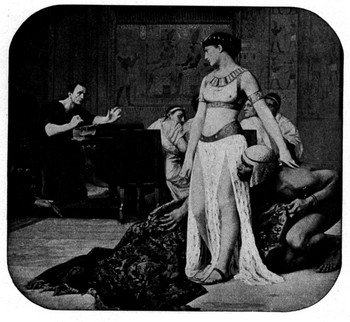Cleopatra: Egypt's Last Pharaoh
Part 2: Return to power
Despite many famous artworks that show otherwise, Cleopatra is thought to have been not beautiful at all. Ancient coins show her with a long hooked nose. She had a very persuasive voice, though, and was highly intelligent, and she had a keen mind for politics. And she was a powerful woman ruling an important kingdom in a time when surrounding powers desperately wanted control or at least friendship with her.
One of these surrounding powers was Rome, which was still a Republic in those days. At the time that Cleopatra was forced into exile, a battle for supremacy in Rome was raging between Julius Caesar and Pompey (the same man who helped Cleopatra's father regain his throne). The two Roman armies fought a famous battle at nearby Pharsalos. When Caesar won, Pompey sailed to Alexandria, seeking Egypt's protection. Ptolemy XIII, however, was no friend to Pompey, despite the general's friendship with the previous Egyptian ruler. Ptolemy had Pompey killed because his advisers told him it would be better to side with Caesar in the Roman civil war.
 A few days later, Caesar arrived on the outskirts of Alexandria. The pharaoh sent representatives to Caesar to prove to him that his arch-rival was dead, hoping to impress him. Caesar was appalled, however. Despite their struggle, the two men had been friends. Caesar marched into the city and seized control of the royal palace. He declared himself to be in control of the situation and began issuing orders to frightened palace staff. Cleopatra, meanwhile, was back in Egypt, massing an army to take the throne back by force. Caesar, aware of this, ordered both Ptolemy and Cleopatra to come to him to solve their dispute.
A few days later, Caesar arrived on the outskirts of Alexandria. The pharaoh sent representatives to Caesar to prove to him that his arch-rival was dead, hoping to impress him. Caesar was appalled, however. Despite their struggle, the two men had been friends. Caesar marched into the city and seized control of the royal palace. He declared himself to be in control of the situation and began issuing orders to frightened palace staff. Cleopatra, meanwhile, was back in Egypt, massing an army to take the throne back by force. Caesar, aware of this, ordered both Ptolemy and Cleopatra to come to him to solve their dispute.
Cleopatra knew that she couldn't slip by Ptolemy's army and get into the palace unnoticed, so she devised an ingenious plan. She wrapped herself in a large rug and had the rug delivered to Caesar as a gift. Caesar was so impressed with her cleverness and determination to see him that he chose her side instantly.
At the prescribed meeting the next day, an angry Ptolemy saw Caesar and Cleopatra together and knew that he would have no chance of gaining Caesar's favor. He made to leave but was arrested by Caesar's soldiers. Ptolemy's army laid siege to the palace, and Caesar released the young king. The fighting continued, however, for almost six months. The Roman army achieved victory in the end, and Ptolemy was killed trying to flee. Caesar then declared Cleopatra to be the rightful pharaoh of Egypt.
A few months later, Caesar returned to Rome. To make sure that civil war didn't happen again, he left many Roman troops behind to reinforce the idea that Cleopatra really was pharaoh. A year later, Caesar invited Cleopatra to visit him in Rome. At this time, Caesar was very much in control in Rome, the victor on the battlefield and in the Senate.
He had been named dictator for life. Many people, including several powerful Senators, were jealous of Caesar's power and worried for the future of the Republic. Caesar didn't help matters when he made it known that he was going to try to have a law passed enabling him to marry Cleopatra. (He already had a wife, named Calpurnia.)
On March 15, 44 B.C., Caesar was killed. Fearing for her safety, Cleopatra fled Rome, returning to Egypt.
Next page > In the End > Page 1, 2, 3
|



 A few days later, Caesar arrived on the outskirts of Alexandria. The pharaoh sent representatives to Caesar to prove to him that his arch-rival was dead, hoping to impress him. Caesar was appalled, however. Despite their struggle, the two men had been friends. Caesar marched into the city and seized control of the royal palace. He declared himself to be in control of the situation and began issuing orders to frightened palace staff. Cleopatra, meanwhile, was back in Egypt, massing an army to take the throne back by force. Caesar, aware of this, ordered both Ptolemy and Cleopatra to come to him to solve their dispute.
A few days later, Caesar arrived on the outskirts of Alexandria. The pharaoh sent representatives to Caesar to prove to him that his arch-rival was dead, hoping to impress him. Caesar was appalled, however. Despite their struggle, the two men had been friends. Caesar marched into the city and seized control of the royal palace. He declared himself to be in control of the situation and began issuing orders to frightened palace staff. Cleopatra, meanwhile, was back in Egypt, massing an army to take the throne back by force. Caesar, aware of this, ordered both Ptolemy and Cleopatra to come to him to solve their dispute.
